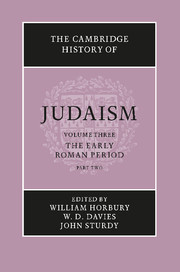Book contents
- Frontmatter
- 1 The archaeology of Palestine 63 bce–ce 70
- 2 The Herodian Temple
- 3 Recent archaeology in Palestine: achievements and future goals
- 4 The contribution of Jewish inscriptions to the study of Judaism
- 5 The social, economic and political history of Palestine 63 bce–ce 70
- 6 The Diaspora in the Roman period before ce 70
- 7 The Gentiles in Judaism 125 bce–ce 66
- 8 Gentiles as seen by Jews after ce 70
- 9 The synagogue
- 10 The Temple and the synagogue
- 11 The early liturgy of the synagogue
- 12 Women in the synagogue
- 13 The Pharisees
- 14 The Sadducees – their history and doctrines
- 15 The Essenes
- 16 The baptist sects
- 17 The troublemakers
- 18 The Samaritans and their sects
- 19 Galilean Judaism and Judaean Judaism
- 20 Jesus: from the Jewish point of view
- 21 Paul: from the Jewish point of view
- 22 Jewish Christianity
- 23 Apocalyptic: the disclosure of heavenly knowledge
- 24 The Qumran sectarian writings
- 25 The Dead Sea Scrolls and pre-Tannaitic Judaism
- 26 Prayer in the Qumran Texts
- 27 Philo of Alexandria
- 28 Josephus (ce 37–c. 100)
- 29 The rabbi in second-century Jewish society
- 30 The Hellenistic–Roman Diaspora ce 70–ce 235: the archaeological evidence
- 31 The legacy of Egypt in Judaism
- 32 Jewish elements in gnosticism and magic c.ce 70–c.ce 270
- Bibliographies
- Index
- References
9 - The synagogue
Published online by Cambridge University Press: 28 March 2008
- Frontmatter
- 1 The archaeology of Palestine 63 bce–ce 70
- 2 The Herodian Temple
- 3 Recent archaeology in Palestine: achievements and future goals
- 4 The contribution of Jewish inscriptions to the study of Judaism
- 5 The social, economic and political history of Palestine 63 bce–ce 70
- 6 The Diaspora in the Roman period before ce 70
- 7 The Gentiles in Judaism 125 bce–ce 66
- 8 Gentiles as seen by Jews after ce 70
- 9 The synagogue
- 10 The Temple and the synagogue
- 11 The early liturgy of the synagogue
- 12 Women in the synagogue
- 13 The Pharisees
- 14 The Sadducees – their history and doctrines
- 15 The Essenes
- 16 The baptist sects
- 17 The troublemakers
- 18 The Samaritans and their sects
- 19 Galilean Judaism and Judaean Judaism
- 20 Jesus: from the Jewish point of view
- 21 Paul: from the Jewish point of view
- 22 Jewish Christianity
- 23 Apocalyptic: the disclosure of heavenly knowledge
- 24 The Qumran sectarian writings
- 25 The Dead Sea Scrolls and pre-Tannaitic Judaism
- 26 Prayer in the Qumran Texts
- 27 Philo of Alexandria
- 28 Josephus (ce 37–c. 100)
- 29 The rabbi in second-century Jewish society
- 30 The Hellenistic–Roman Diaspora ce 70–ce 235: the archaeological evidence
- 31 The legacy of Egypt in Judaism
- 32 Jewish elements in gnosticism and magic c.ce 70–c.ce 270
- Bibliographies
- Index
- References
Summary
The synagogue has been and is one of the most important Jewish institutions, the spiritual, cultural and religious centre of any Jewish community. It fulfilled a multitude of functions in antiquity, of which the most important, besides those of prayer and worship, was the teaching of the Law. It was where the Jews assembled to pray and to hear on the Sabbath the weekly reading and interpretation of the Torah; it was where their children gathered to receive instruction from their teachers; it was where they could get advice on everyday questions concerning the observance of the commandments; it was where problems of the Halakah were discussed and resolved, and so on.
In addition to these religious functions, the synagogue also had an entirely secular role. It was where announcements were made that concerned the community; it acted as a kind of ‘lost property office’; it was the place where legal witnesses could be found. In other words, the synagogue fulfilled the functions of a secular as well as a religious centre, and of a civil administration. In addition, there was its role of providing accommodation for visitors, especially in the synagogues of minority Jewish communities (Landsmannschaften), and in the Diaspora.
We find numerous references to synagogues and their functions in Philo, Josephus, the New Testament and rabbinic literature. Archaeological finds have also substantially enriched our knowledge of synagogues. Above all, in the last eighty years a wide-ranging literature has dealt with the different aspects of synagogues, from the explanation of individual words in synagogue inscriptions to monographs treating their origin and all the problems related to their study.
- Type
- Chapter
- Information
- The Cambridge History of Judaism , pp. 267 - 297Publisher: Cambridge University PressPrint publication year: 1999
References
- 1
- Cited by

